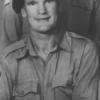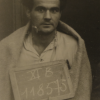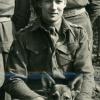Brigadier Colin Bowden OBE
I was a 19 year old second lieutenant in September 1973, having taken command of 6 Platoon B Company in June of that year in South Armagh. My first Commanding Officer, Geoffrey Howlett is with us today. It was he who handed command of 2 PARA to Colin that summer. Colin had just transferred to The Parachute Regiment from The Queens Lancashire Regiment, so both of us were ‘new boys’, albeit, he was somewhat more senior than myself – in fact, double my age. It was for me quite a challenge, having entered Sandhurst straight form RGS Guildford the previous September, aged 18 years, intending to join my county Regiment, The Queen’s Regiment, yet having had an ambition to try for The Parachute Regiment since the age of 6 when I watched the re-enactment of the Suez drop of 1956 in the arena at Earls Court in 1960 at The Royal Tournament.
2 PARA was by then a very experienced Battalion, with five Northern Ireland tours under its belt. So CO 2 PARA and OC 6 Platoon were both shoved into the ‘deep end’ of the Cold War on Exercise DEEP FURROW in Turkey, one of the largest parachute and marine landings in modern times in Turkish Thrace. Our drop was organised by the Air Adjutant, Dair Farrar-Hockley, a master of precision and detail as was required. Nevertheless, a corporal was killed at the time of the descent. We did not know it then but for the Turks, this was in effect a dress rehearsal for its invasion of Cyprus in July the following year, dropping near Nicosia and with an amphibious landing at Kyrenia.
Come the end of the exercise, true to form, the heavens opened and we were soaked to the skin. Colin, rightly, wanted to return the battalion to dry accommodation as quickly as possible by vehicle. The Turkish liaison officer, a very articulate young captain remonstrated with Colin – Thrace was a war zone and no movement was permitted by night – and to make the point, the LO then said, ‘Sir if you do move tonight, I will be summarily shot tomorrow morning’. So quite a problem and Colin had to visit the Turk regional commander to plead with him on bended knee, eventually succeeding but only after much humiliating grovelling.
My own immaturity as a second lieutenant was all too obvious, not helped by a mere 6 months on the first of the Standard Military Courses at Sandhurst, which to me seemed composed of endless drill parades and not much else. Colin realised that all was not well in 6 Platoon and in early 1974, I was placed upon the Platoon Sergeants’ Battle Course (PSBC) at Brecon, there having been no vacancies on the Platoon Commanders’ Battle Course (PCBC) for short service officers at that time. Somehow I passed ‘Senior Brecon’ and my claim to fame is that I am the only officer to have done so in living memory, which also much improved my standing in the WOs and Sergeants Mess in 2 PARA – phew!
My confidence was much restored and I continued with 6 Platoon B Company, now on Exercise CALYPSO HOP in Jamaica. There we embarked upon a landing by patrol craft on the south side of the island and then began an arduous night march over the John Crow mountains. Leading a platoon in such terrain and in darkness requires a lot of effort and I was constantly checking that we were all together. In the darkness I grabbed what I thought was a Tom who was out of order and remonstrated with him in no uncertain terms. ‘What the f…k do you think you’re playing at!!’ A very calm voice responded, 'Actually, I’m your Commanding Officer’. Colin had the decency to then say, ’Well done – you were right to grip me like that, but could you lower the tone of your language next time.'
More NATO exercises followed in Norway and then north Germany when we parachuted just south of the Kiel Canal by day and then by night with our TA Battalion on the second lift, Dair, again in control of all air movement. I was on that second run as a Tom had collapsed on my first day jump and we had to return to UK. The only trouble was that the Canal Master had for some reason misjudged timings and thus the canal was still in use as the C-130s flew overhead in the darkness. The RAF pilots then presumed that the ship lights were those of the drop zone, dropping us sooner than we should have done, with six TA soldiers drowned in the process. I had high twists and pulled my reserve for the first time, landing within splashing sound of the canal, so my time with 2 PARA might well have been very short lived. The Canal Master committed suicide the following morning.
As was customary, the officers, led by the CO, served Xmas lunch in December of that year. By then we had been warned off that 2 PARA was to return to Northern Ireland in mid- 1975. As was usual the CO made a short speech wishing us well on our Xmas leave. Then the bombshell, ’Oh, by the way, we will be heading out to Malaysia for jungle training just after Xmas as preparation for the NI tour’: there were hoots of derision that this announcement engendered but it was true and we duly deployed, the 2 PARA Borneo hands very much in their element from the 1964 tour when B Company under command of Jon Fleming, now chairman of the PARA 2 Club, had beaten off an Indonesian battalion attack. (I should mention that Geoffrey Howlett is a life President of the Club). What we were not told at the time was that the deployment of the bulk of 16th Parachute Brigade plus SAS was as contingency for the possibility of having to evacuate British nationals under fire from the North Vietnamese. In the event these were peacefully evacuated via Cambodia, which was then neutral and permitted RAF planes to land but, ‘no troops thank you’.
So we went to North Belfast in lieu. Colin Bowden was at pains to point out that Northern Ireland had changed since our tours of the early 1970s. Most of PIRA were safe and soundly interned and PIRA was on a ceasefire, only still willing and able to conduct so called ‘self-defence’ sectarian attacks on the Shankhill road and did just that, as were the protestant terror groupings in what became ‘tit for tat’ murders. In all, between May and September 1975, we were trying to deter and prevent some 25 murders, of which that by PIRA at the Bayardo bar on 13 August 1975, killing four innocent Protestants and wounding 60 more, was by far the worst atrocity.
What they didn’t bargain for was that 2 PARA had set up a checkpoint on one of the very few entrances to Ardoyne, neatly arresting the entire Active Service Unit, Colin Bowden just happening to be at the check point when the vehicle turned up - so a great coup for us and, the entire ASU sentenced to life imprisonment.
In my view, Colin Bowden demonstrated exceptional leadership over his command in north Belfast, walking, if you will, a ‘tight rope’ between the Republican community in his desire to defend them yet at the same time deter PIRA from its revenge attacks, and the majority Protestant community, which was quite prepared to tolerate terrorism in its name and yet bleated very loud indeed when PIRA succeeded in its own attacks, even such as the arson attack on the Right Hon Gerry Fitt, MP’s home in the New Lodge, which he has made very clear to me when we met in the bar of the House of Commons years later, was at ‘our negligence’!
I also have to say that taking a ‘light touch’ was not at all popular with Colin’s subordinates, some of whom demonstrated outright insubordination and gross disrespect to all that Colin was trying to do, which included my own company commander and others. Meanwhile, on the home front, Colin’s late wife, Susannah, was also ‘doing her bit’ so as to maintain morale amongst our wives and families.
All I will say of Colin is of how very fortunate we were to have had him as our CO. He was always kind, courteous, good humoured, quizzical, yet firm and fair in his dealings. I learnt a great deal from him as I also did from John Frost, who took the Arnhem bridge, Geoffrey Howlett who led the early NI tours and later, David Chaundler, who was CO 2 PARA for our second Falklands battle on Wireless Ridge.
I did not know it in 1973-5 but I too was to command 2 PARA between 1994-7, including a 6 month tour of duty in South Armagh, precisely where I had begun as a young officer, now with a command of around 1,000 men and women. For Colin, as for myself, I am sure that command of 2 PARA must have been the crowning moment of his Service commitment - I never use the other word ‘career’. He did us proud and we have much for which to be grateful. Well done Colin!
David Benest OBE Colonel (retired) CO 2 PARA 1994-7 (with contributions from Dair Farrar-Hockley, Geoffrey Howlett, Rupert Smith and Tony Clark),





Latest Comments
There are currently no comments for this content.
Add Comment
In order to add comments you must be registered with ParaData.
If you are currently a ParaData member please login.
If you are not currently a ParaData member but wish to get involved please register.